Table of Contents
Using one of the best social media for writers is crucial for all writers, whether aspiring or established. The right social media platform can open doors to countless opportunities, from networking with industry professionals to reaching a global audience.
However, not all social media platforms offer the same benefits for writers. Some platforms are better suited for sharing short-form content, while others excel at fostering long-form discussions or visual storytelling. The key is to find the platform that aligns with your goals as a writer.
This article explores a variety of social media platforms, detailing their features, pros, and cons, to help writers identify the best fit for their needs. Whether you’re looking to engage with a community of readers or get your work noticed by publishing insiders, there’s a platform out there for you.
11 Best Social Media for Writers
While looking for the best social media for writers, it’s important to consider what each platform can offer. Whether you’re aiming to share snippets of your latest novel, gather feedback on your poetry, or simply connect with fellow literature enthusiasts, there’s a platform for your needs.
1. X (former Twitter)

X is a dynamic platform that allows writers to share their thoughts, connect with their audience, and network within the literary community—all in real time. With its concise format and the use of hashtags, X makes it possible to reach a broad audience quickly and effectively.
It’s a place where writers can engage in literary conversations, share snippets of their work, and follow trends in the publishing world.
Features:
X’s strength lies in its brevity and immediacy. The platform’s character limit encourages concise communication, making it a challenge but also an art to capture attention with few words.
Hashtags and trending topics help in gaining visibility, while X chats offer opportunities for deeper engagement with readers and fellow writers.
The platform is also known for its live-“tweeting” feature, which can be used during events like book launches or readings.
Pros:
- Networking Opportunities: X’s vast user base includes authors, publishers, and literary agents, offering unparalleled networking opportunities.
- Immediate Feedback: The platform’s real-time nature allows for instant interaction with followers, providing immediate feedback on ideas or works in progress.
- Visibility: Through the strategic use of hashtags, writers can increase their visibility, reaching beyond their immediate follower base to engage with a broader audience.
Cons:
- Character Limit: The platform’s character limit can be restrictive, making it challenging to convey complex ideas or share longer excerpts of work.
- Fast Pace: X’s fast-paced environment means that content can quickly get buried under newer tweets, requiring constant engagement to remain visible.
- Overwhelm: The sheer volume of content and the rapid pace can be overwhelming for some users, making it difficult to keep up with conversations or maintain visibility without frequent posting.
For writers looking to establish a presence on social media, X offers a unique platform for engagement and visibility.
It encourages concise, creative expression and provides a gateway to a global literary community. However, its limitations and pace require a strategic approach to truly benefit from what it has to offer.
2. Facebook
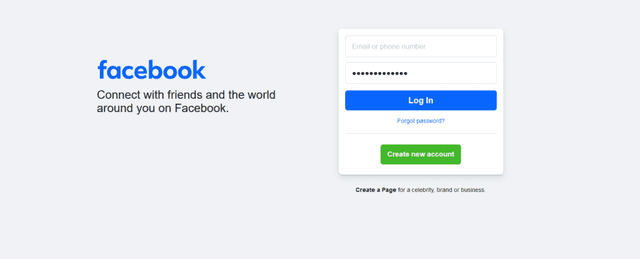
Facebook stands as one of the most versatile social networking platforms for writers, offering a wide array of tools and communities that cater to the literary world.
From creating personal author pages to joining genre-specific groups, Facebook facilitates engagement with readers, promotes events, and even enables the sharing of long-form content through posts or notes.
Its broad user base ensures that writers can connect with a diverse audience, including fans, fellow writers, and publishing professionals.
Features:
Facebook’s most notable feature for writers is its groups and pages, which allow for the creation of dedicated spaces for interaction and promotion. Writers can join groups to connect with like-minded individuals, share their work, and participate in discussions.
Author pages provide a public platform for writers to showcase their work, announce book releases, and schedule events.
The platform also supports multimedia content, enabling writers to share not just text but also images, videos, and live broadcasts, adding depth to their storytelling and promotional activities.
Pros:
- Community Engagement: Facebook’s groups offer a space for writers to engage with specific communities, receive support, and exchange feedback.
- Diverse Tools for Promotion: The platform’s various features, like events, live videos, and targeted ads, provide powerful tools for book promotion and reader engagement.
- Broad Reach: With its vast user base, Facebook allows writers to reach a wide and varied audience, increasing the potential for visibility and book sales.
Cons:
- Algorithm Limitations: Changes in Facebook’s algorithm can sometimes reduce the visibility of posts to followers, impacting engagement and reach.
- Information Overload: The vast amount of content on the platform can make it challenging for writers to stand out and capture the attention of their audience.
- Privacy Concerns: Writers must navigate privacy settings carefully to balance public engagement with personal privacy.
Facebook serves as a comprehensive platform for writers seeking to build and engage with their audience. It offers a mix of promotional tools and community features that can significantly aid in a writer’s visibility and interaction with readers.
However, success on Facebook requires strategic navigation of its algorithms and a proactive approach to content creation and community participation.
3. Instagram
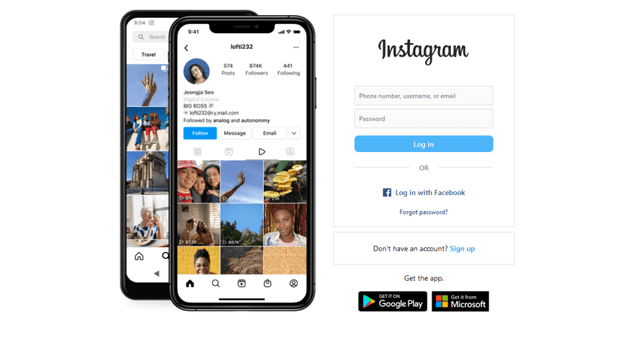
Instagram has rapidly evolved into a visually driven platform, making it an ideal space for writers who seek to connect with their audience through more than just words.
By blending captivating imagery with text, authors can craft a compelling narrative around their work, engaging readers in a way that’s both intimate and visually appealing.
Whether it’s through snapshots of daily life, quotes from their latest work, or behind-the-scenes glimpses into the writing process, Instagram provides a unique canvas for storytelling.
Features:
Instagram’s appeal lies in its simplicity and visual focus. Features like Stories, posts, Reels, and IGTV allow writers to share varied content, from short video clips to longer narrative pieces.
The use of hashtags on Instagram is particularly powerful, offering a way to reach beyond one’s immediate followers and tap into a wider community of literature enthusiasts and readers.
The platform’s emphasis on aesthetics encourages writers to think creatively about how they present their work and themselves, blending visual art with literary art in a seamless narrative.
Pros:
- Visual Storytelling: Instagram enables writers to use visuals to complement their written work, making stories more engaging and accessible.
- Community Engagement: The platform fosters a strong sense of community, allowing writers to interact with fans and fellow authors through comments, likes, and direct messages.
- Brand Building: For authors looking to build a personal brand, Instagram’s visual nature helps in creating a recognizable and relatable image.
Cons:
- Visual Content Requirement: Success on Instagram often depends on the quality of visual content, which can be a challenge for writers more focused on text.
- Algorithm Challenges: The Instagram algorithm can make it difficult for new or smaller accounts to gain visibility without consistent engagement and content posting.
- Time Investment: Maintaining an active and aesthetically pleasing Instagram account requires a significant investment of time and creativity.
Navigating Instagram as a writer is like curating a visual journal that accompanies your literary journey. Each post offers a window into the writer’s world, inviting readers to step in and explore.
This personal touch not only strengthens the bond with existing fans but also attracts new ones, intrigued by the blend of visuals and text.
However, crafting a presence on Instagram that truly resonates can feel like a delicate art form, demanding both consistency and creativity.
For those writers who venture into Instagram’s vibrant landscape, the platform can become a powerful ally in storytelling.
While the emphasis on visuals may seem daunting at first, the rewards of forging deeper, more personal connections with readers are invaluable.
The challenge lies not just in showcasing one’s work but in revealing the heart and soul behind the words, turning Instagram into a canvas for both the art of writing and the art of living.
4. Medium
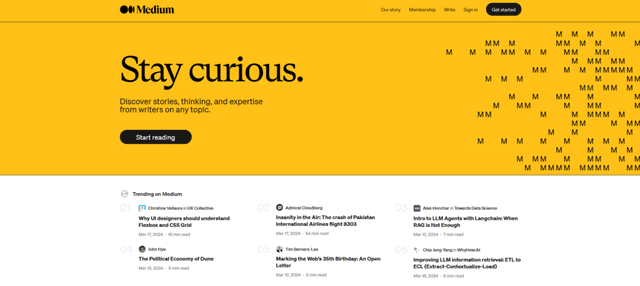
Medium is a fantastic spot for writers who want to share their work without the hassle of running their own website. It’s pretty straightforward, making it super easy for anyone to start publishing articles, stories, or whatever they’re passionate about.
What’s cool about Medium is that it’s not just about throwing your words into the void; there’s a whole community of readers and writers there, ready to read what you’ve got to say.
Features:
One of the best things about Medium is how simple it makes everything. If you’re not too tech-savvy, no worries—Medium’s got you covered with its easy-to-navigate layout.
You can write about pretty much anything, from quick thoughts on your latest read to deep dives into more serious topics.
And you’re not just writing for yourself; Medium has this neat way of suggesting your articles to readers who are into the same stuff, helping you get your words out there.
Pros:
- Super Simple to Use: Even if tech isn’t your thing, you’ll find Medium easy to get along with. Publishing is straightforward, with no fancy skills required.
- Built-in Audience: There’s already a crowd of eager readers on Medium, which means you don’t have to start from scratch to find people who’ll appreciate your work.
- Earn a Little Extra: Medium has this partner program that lets you earn money based on how much people are into your articles. It’s not a goldmine, but it’s a nice bonus if your writing hits the mark.
Cons:
- Tough Competition: Because it’s so accessible, there’s a lot of content on Medium. Standing out can be a bit of a challenge with so many voices on the platform.
- Income Isn’t Guaranteed: The money from the partner program is great when it works, but it’s not always consistent. Don’t quit your day job just yet.
- Limited Control: You’re writing on someone else’s platform, which means you don’t get to call all the shots on how things look or function.
Diving into Medium feels like joining a bustling cafe where everyone’s keen to share stories and listen. It’s a place where your voice can find a home, whether you’re jotting down personal experiences or sharing expert knowledge.
The vibe is welcoming, encouraging you to keep tapping away at the keyboard.
For writers looking to get their feet wet in the online world, Medium is a solid starting point. It’s a place where the barriers to entry are low but the potential to connect with readers is high.
Sure, it might take a bit of effort to get noticed among the many voices, but the opportunity to engage with an interested audience makes it worth the try.
5. Goodreads
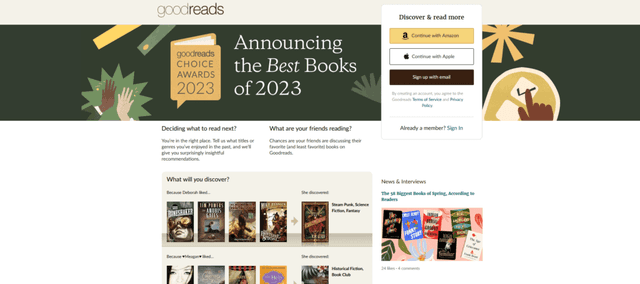
Goodreads is like a giant book club where everyone’s invited. Writers can jump right in, not just to promote their work but also to connect with a community that loves books as much as they do.
It’s more than just a place to list what you’re reading or find your next book; it’s a space where authors can interact directly with their readers, get feedback on their books, and see what’s buzzing in the literary world.
Features:
The cool thing about Goodreads is it lets writers set up author profiles. This means you can have all your books in one spot, share updates, and even host Q&A sessions.
There’s also the option to join or create book clubs and discussion groups, which is great for diving deep into genres or themes you’re passionate about.
Plus, the review system gives you a direct line to see what readers really think about your work.
Pros:
- Direct Connection with Readers: It’s like being in a room full of people who are all fans of books. You can chat, get feedback, and see what your readers are into.
- Visibility for Your Books: Your author profile acts as a showcase for your work. People can easily find all your books, read about them, and even click through to buy them.
- Community Support: Whether it’s joining discussions or participating in reading challenges, the sense of community on Goodreads is strong. It’s encouraging to be among so many book lovers.
Cons:
- Mixed Reviews: The flip side of getting feedback is that not all of it will be glowing. Handling negative reviews publicly can be a challenge.
- Can Be Overwhelming: With so many features, groups, and discussions, it can feel a bit like trying to find a quiet corner in a crowded room.
- Promotion Limits: While it’s great for engagement, Goodreads isn’t designed as a promotional tool. You’ve got to be subtle about how you share your work to avoid turning off potential readers.
Hanging out on Goodreads feels like you’re at a never-ending book festival. You’re there with your books, meeting readers, signing copies in your head, and chatting about your favorite characters and plots.
It’s this massive pool of bookworms, and you’re swimming right in the middle of it.
Goodreads isn’t just a billboard for your books; it’s a way to genuinely connect with the people who will love them.
Sure, navigating the vastness of it all can be a bit much sometimes, and not every review is going to make your day, but the chance to be part of such an enthusiastic community is pretty special.
It’s about building relationships, one reader at a time, and finding your tribe in the vast world of book lovers.
6. LinkedIn
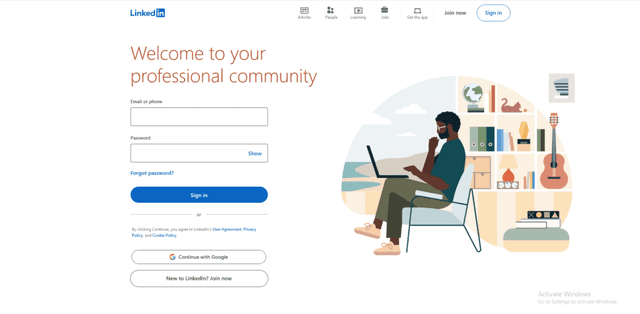
LinkedIn is the go-to place for professional networking, and yes, that includes writers too. It’s not just for job hunting or sharing industry news; it’s a platform where writers can showcase their expertise, connect with publishers, and even find freelance opportunities.
Think of it as a more buttoned-up version of social media, where your accomplishments and portfolio are front and center.
Features:
What sets LinkedIn apart is its focus on professional connections. You can create a profile that highlights your writing experience, published works, and skills. There’s also the option to publish articles directly on LinkedIn, which can help establish you as an authority in your field or genre.
Plus, joining writing-related groups allows you to participate in discussions, share insights, and connect with others in the literary community.
Pros:
- Professional Visibility: Your LinkedIn profile is like a digital resume that’s always working for you, showcasing your writing achievements and skills to potential collaborators or clients.
- Networking Opportunities: From publishers to fellow writers, LinkedIn is full of professionals you can connect with to expand your network and open up new opportunities.
- Direct Publishing Platform: Sharing your writing directly on LinkedIn can boost your credibility and attract attention from industry professionals.
Cons:
- More Formal Atmosphere: The professional nature of LinkedIn means it’s less about creative expression and more about business, which might not suit all writers.
- Engagement Can Be Low: Because it’s a professional network, posts about personal writing projects might not get as much interaction as they would on more casual platforms.
- Competition for Attention: With so many professionals on the site, standing out without a clear strategy or niche can be challenging.
Jumping into LinkedIn feels a bit like attending a writers’ conference wearing your best suit. You’re there to make connections, learn from others, and maybe even snag a few opportunities.
It’s less about sharing your latest blog post and more about building relationships that could lead to your next big project or collaboration.
For writers willing to navigate its professional landscape, LinkedIn offers a unique opportunity to connect with the publishing industry and related fields.
It’s a place where your achievements can shine and where professional growth is just a connection request away.
Sure, it might not be the first place you’d think to share your poetry, but for building a professional network and establishing your credentials, it’s pretty hard to beat.
7. Bluesky
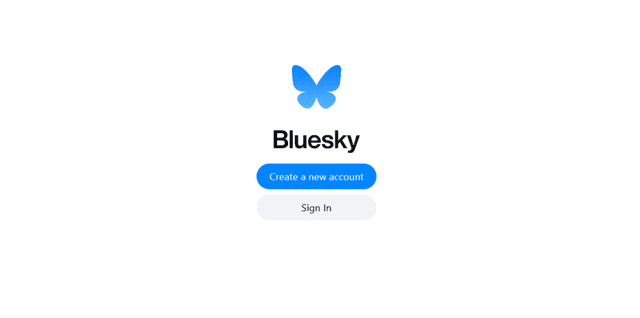
Bluesky is a newcomer on the social media scene, promising a fresh approach to online communication and community building.
For writers looking for a new platform to share their work and ideas, Bluesky offers an intriguing option. It’s designed to foster open and decentralized conversations, potentially providing a more authentic space for creative expression and engagement.
Features:
At its core, Bluesky is about giving control back to the users, with a focus on interoperability and freedom from the constraints typically imposed by traditional social networks.
This means writers can share their work in a space that values open dialogue and diverse perspectives. The platform supports a variety of content types, from short posts to longer articles, making it a flexible tool for writers of all kinds.
Pros:
- Innovative Platform: Being part of Bluesky means joining an emerging community that’s exploring new ways of online interaction, which could offer unique opportunities for engagement.
- User-Controlled Experience: Bluesky’s emphasis on decentralization allows for a more personalized and less restrictive online environment.
- Creative Freedom: Without the heavy moderation and algorithmic filtering of larger platforms, writers might find a more receptive audience for diverse and creative content.
Cons:
- Growing Pains: As with any new platform, Bluesky faces challenges in building its user base and feature set, which may affect early adoption and visibility for writers.
- Uncertain Future: The long-term success and direction of Bluesky are still up in the air, with developments and changes likely as it evolves.
- Learning Curve: Adapting to a new platform’s tools and culture takes time and effort, especially one that aims to redefine social media norms.
For writers eager to explore new territories in the digital world, Bluesky represents a promising frontier. It’s a chance to be at the forefront of an evolving platform, where the rules of engagement are still being written.
While the uncertainties of a nascent network might seem daunting, the potential for establishing a presence in a fresh, less crowded space is an exciting prospect.
Bluesky offers a unique blend of innovation and creativity, making it a compelling option for writers looking to expand their online presence.
Its commitment to reshaping how we think about social media creates a new playground for writers to experiment, connect, and grow their audiences.
As the platform develops, those who join early may well find themselves leading the way in defining its creative community.
8. Fediverse
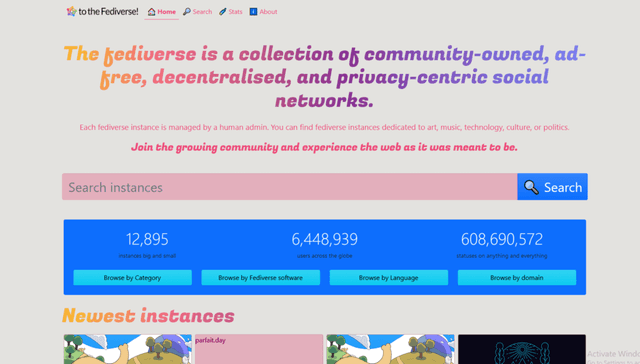
The Fediverse stands out as a unique constellation of interconnected servers, each hosting different social media platforms that operate under a unified protocol.
This decentralized approach offers writers a vast, varied landscape to share their work, connect with niche communities, and engage in meaningful conversations without being bound to the policies of a single platform. It’s like having access to multiple social clubs under one expansive roof, where each room offers a different vibe and audience.
Features:
What makes the Fediverse special is its emphasis on user autonomy and freedom. Unlike mainstream social networks, it empowers users to control their own data and interactions.
Writers can choose a platform within the Fediverse that best suits their style, whether it’s for microblogging, long-form content, or multimedia sharing.
This flexibility allows for a tailored approach to online presence, ensuring that writers can find or create their perfect niche audience.
Pros:
- Diverse Audiences: The decentralized nature of the Fediverse means writers can tap into a wide range of communities and interest groups, increasing the chances of connecting with like-minded readers and fellow writers.
- Control Over Content: Writers have more say over how their content is shared, who sees it, and how interactions are managed, giving them greater control over their online environment.
- Reduced Censorship: With no central authority dictating what can and cannot be posted, writers enjoy more freedom to express themselves creatively and politically.
Cons:
- Complexity: Navigating the Fediverse’s many platforms and understanding how they interconnect can be daunting for newcomers, requiring a bit of a learning curve.
- Varied User Experience: Since the Fediverse consists of multiple platforms, the user experience can vary greatly, which might affect consistency and ease of use.
- Less Mainstream Visibility: Being outside the mainstream social media sphere, content shared on the Fediverse might not reach as broad an audience as it would on more widely used platforms.
For writers keen on exploring digital spaces that offer both freedom and a sense of community, the Fediverse presents a compelling choice.
It’s an opportunity to break free from the limitations of traditional social media, embracing a more open and interconnected way of sharing and engaging with content.
The Fediverse’s decentralized model might require some initial adjustment, but it rewards those willing to explore its depths with a rich, diverse community experience.
It’s a space where writers can truly own their content and their relationships with their audience, making it an exciting option for those looking to craft their online presence on their own terms.
9. Reddit
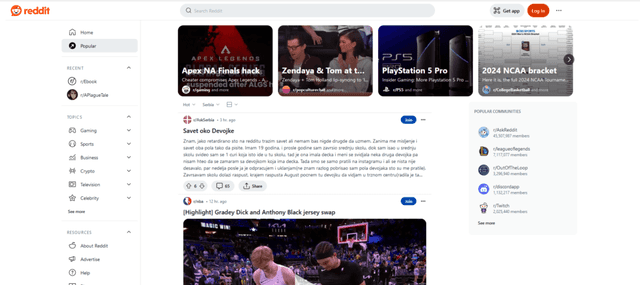
Reddit, often described as the “front page of the internet,” is a vast network of communities based on people’s interests.
For writers, it offers a treasure trove of opportunities to share work, get feedback, engage in discussions, and connect with both readers and other writers. With its subreddit system, you can find a community for nearly any genre, writing style, or literary interest imaginable.
Features:
Reddit’s structure is all about subreddits, individual forums dedicated to specific topics. Writers can join subreddits that match their interests, whether it’s fantasy writing, poetry, non-fiction, or even more niche topics.
These communities allow for in-depth discussions, sharing of resources, and posting of original content. The platform also supports AMAs (Ask Me Anything sessions), where writers can directly interact with readers, offering insights into their writing processes, upcoming works, and personal experiences.
Pros:
- Diverse Communities: There’s a subreddit for almost every writing genre and interest, making it easy to find your tribe or explore new facets of writing.
- Feedback and Collaboration: Many writing subreddits encourage sharing work for critique or offer collaborative projects, providing valuable feedback and growth opportunities.
- Resources and Support: From writing tips to publishing advice, Reddit’s writing communities are rich sources of information and support for both new and experienced writers.
Cons:
- Navigating the Culture: Reddit has its own unique culture and norms, which can take some time to understand and navigate effectively.
- Variability in Experience: The quality of feedback and engagement can vary widely between subreddits, depending on the community’s size and moderation.
- Potential for Overwhelm: With so much content and so many communities, it can be easy to get lost or overwhelmed by the sheer volume of information and conversation.
Reddit is like a bustling city filled with neighborhoods, each offering its own flavor and community. For writers, it’s a place to dive deep into discussions, share your work for constructive criticism, and find endless inspiration.
The platform’s democratic nature means that content visibility is driven by community interest, offering an organic way to gauge the appeal of your writing.
Whether you’re seeking advice, looking to connect with like-minded individuals, or wanting to share your latest piece, Reddit’s writing communities provide a welcoming space.
The key to making the most of Reddit is finding the right subreddits that align with your interests and contributing in ways that add value to the conversations.
As you navigate through its many communities, Reddit can become an invaluable resource in your writing journey, offering both a platform for growth and a window into the vast world of literary interests.
10. Scribophile
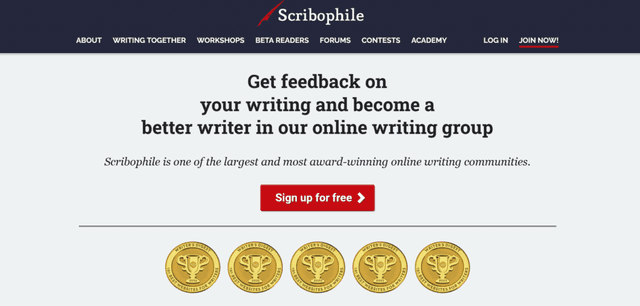
Scribophile is a platform specifically designed for writers who are looking for detailed feedback on their work.
It operates on a credit system where you earn credits by critiquing others’ work, which you can then spend to post your own writing for feedback. This ensures that every piece receives thoughtful, constructive criticism from fellow writers.
It’s an ideal space for those looking to improve their craft through a community-based approach.
Features:
The standout feature of Scribophile is its emphasis on detailed critiques. Unlike platforms where feedback might be more general or sparse, Scribophile encourages in-depth analysis and constructive feedback.
It also offers forums and writing groups, providing a space for writers to discuss writing techniques, publishing advice, and general support. Additionally, Scribophile includes resources like articles and writing tools to further assist writers in their craft.
Pros:
- Quality Feedback: The platform’s critique system ensures that writers receive detailed and constructive feedback on their work.
- Community Support: Scribophile’s forums and writing groups offer a supportive environment for writers of all levels to connect and share experiences.
- Writing Resources: Access to educational articles and writing tools helps writers improve their skills and navigate the publishing world.
Cons:
- Time Investment: Earning credits through critiquing others’ work requires a significant time commitment before you can receive feedback on your own writing.
- Learning Curve: New users may need time to adjust to the platform’s credit system and critique standards.
- Feedback Quality May Vary: While the platform promotes detailed critiques, the quality of feedback can still vary depending on the reviewer’s expertise and effort.
Scribophile provides a structured environment for receiving and giving feedback, making it a valuable resource for writers who are serious about improving their work. The requirement to critique others’ work before posting your own encourages a sense of community and reciprocity.
With its focus on constructive criticism and a supportive community, Scribophile is a useful platform for writers seeking to refine their craft and connect with fellow writers.
11. Wattpad
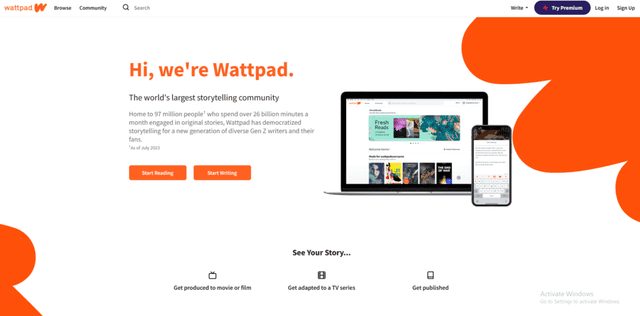
Wattpad has made a name for itself as a leading platform where writers and readers come together to share and discover stories across all genres. It’s a global community that embraces both amateur and professional writers, offering a space where they can publish their work, gather feedback, and gain a following.
Wattpad’s unique model has even seen some stories transition from online serials to published books and movies, highlighting its potential as a launchpad for new writing careers.
Features:
Wattpad is celebrated for its accessibility and reach, allowing writers to upload their stories chapter by chapter and interact directly with their readers through comments and votes.
This real-time feedback can be invaluable for writers looking to refine their work and understand their audience better.
Additionally, Wattpad hosts annual awards called the Watty Awards, recognizing excellence and innovation on the platform, and offers partnership opportunities through Wattpad Books and Wattpad Studios to help successful writers publish their work or adapt it for screen.
Pros:
- Massive Audience: With millions of users worldwide, Wattpad offers a vast audience for writers, providing the chance to build a substantial readership.
- Interactive Feedback: The platform encourages reader engagement, offering writers insights into their audience’s reactions and preferences.
- Opportunities for Publication: Successful Wattpad stories have the potential to be published or adapted into films or TV shows, offering a unique pathway to professional success.
Cons:
- High Competition: The sheer volume of content on Wattpad means that it can be challenging for new writers to get noticed without consistent effort and engagement.
- Quality Variability: Given its open nature, the quality of writing on Wattpad can vary widely, which might affect the overall reading experience.
- Revenue Generation: While there are success stories, generating income directly from Wattpad is not straightforward for most writers, requiring participation in specific programs like Wattpad Paid Stories.
Wattpad stands out as an innovative platform that bridges the gap between writers and readers, offering a dynamic space to share stories and grow a loyal fanbase. Its commitment to uncovering new talent and providing avenues for writers to succeed beyond the platform underscores its role as a cornerstone in the digital writing community.
For aspiring authors, Wattpad represents not just a place to share their work, but a community that nurtures creativity, offers feedback, and opens doors to new opportunities.
With dedication and engagement, writers can leverage Wattpad’s extensive network to embark on a successful writing journey.
Conclusion
Finding the best social media for writers depends on individual goals, the type of content you create, and the audience you wish to engage with. Each platform offers unique advantages, whether it’s building a professional network on LinkedIn or sharing visual story snippets on Instagram.
It’s essential for writers to experiment with different platforms to discover where their voice resonates the most. By understanding the strengths and limitations of each platform, writers can strategically tailor their online presence, maximizing their reach and impact in the literary world.



